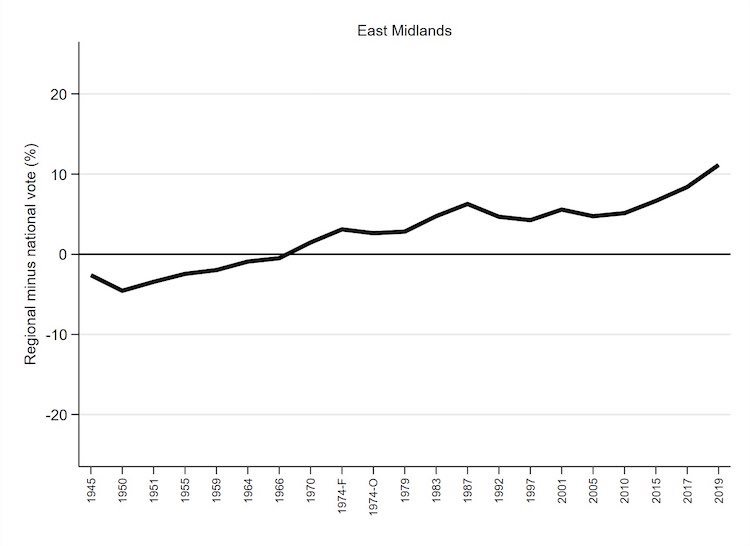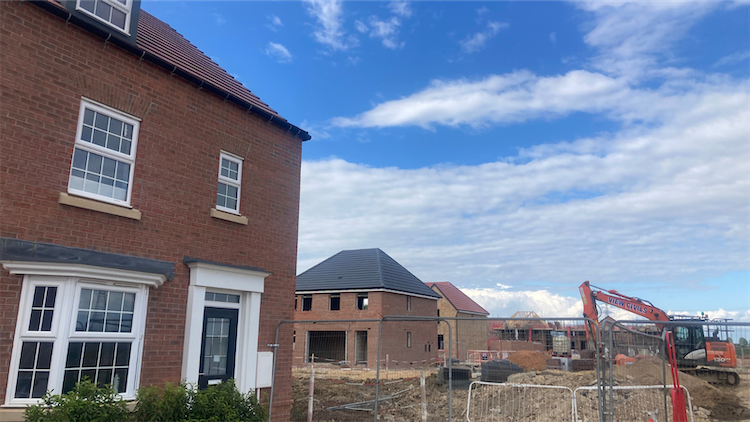Voters In New Build England Say Conservative Promises Have Been Broken
The private housing developments in Nottinghamshire mostly consist of large detached homes with up to five bedrooms (PoliticsHome)
9 min read
Modern housing developments in Nottinghamshire promised residents a better life, but now they feel some of those promises have been broken. And while many of these voters are ready for “change”, they remain unsure of who they can trust to deliver it.
Leaving the red brick terraced streets of Nottingham and driving north-east out of the city, you are met with miles of private housing development sites scattered across the hilltops. These new neighbourhoods appear clean and pleasant, with Mercedes Benz and BMW cars lining the driveways of spacious detached houses. But when you speak to people who live there, it is clear there is discontent bubbling under the surface.
“People are reasonably well off here. There's not that much poverty… The bit that I live in is all four and five bedroom houses and everyone's working,” Aisa, a 42-year-old social worker, told PoliticsHome. She and her family have recently moved to one of the new developments on the outskirts of Nottingham in Gedling, overlooking the countryside.
“But the cost of living is just incredible. We can't afford to go on a foreign holiday. The cost of food is going up all the time, we’re constantly thinking about how we're going to pay for things if the car goes wrong, or the boiler goes…”
Having moved out of the inner city, Aisa hoped moving here would mean access to better schools for her children. “But there is a problem with teacher retention everywhere,” she said.
“Every family, even if you are working, has got this in mind at the moment. We've had the Conservative government for so long, and they're not doing anything for working families. There's got to be a change.”
 New developments being built on the outskirts of Nottingham (PoliticsHome)
New developments being built on the outskirts of Nottingham (PoliticsHome)
The Gedling constituency, which straddles urban and rural areas, voted for Tony Blair's Labour in 1997 before switching to Boris Johnson's Conservatives in 2019. Current polling suggests it is highly likely Labour will win it back by a considerable margin on 4 July. However, Aisa, along with other residents, told PoliticsHome she was not yet fully convinced by what Keir Starmer's party is offering.
A 30-year-old accountant, who did not want to be named, said he would be voting for the Green Party as it promised to scrap the ‘Right to Buy’ scheme that allows people to buy council houses. He recently moved to a new housing estate in Gedling as he had been priced out of a “crumbling Victorian townhouse” in Brighton and was attracted by the higher quality, lower cost new homes in the Midlands.
There was originally going to be a primary school built on his estate, but these plans have now been scrapped, leading to a feeling among residents that a lot of developers were trying to “wriggle out of their obligations” in the area and going back on promises to build shops, schools and roads to accompany new estates.
“It makes you feel that the developers are only really in it for the immediate profit of cramming in as many people as possible, rather than building more social goods which are necessary, but don't provide much of a financial return,” he said.
Deeper in the countryside, you enter the neighbouring constituency of Newark, a Conservative seat since 2001 where the incumbent MP was former immigration minister – and potentially future party leadership candidate – Robert Jenrick. In the first YouGov MRP poll during this election campaign, it was the most marginal seat in the country, listed as a toss-up between the Tories and Labour.
 Conservative former immigration minister Robert Jenrick is defending his seat in Newark (Alamy)
Conservative former immigration minister Robert Jenrick is defending his seat in Newark (Alamy)
Despite Newark having a different voting profile to Gedling, they are both undergoing similar demographic shifts, with more families and younger working professionals moving into the numerous new estates being built. Residents in Balderton and Fernwood on the outskirts of Newark-upon-Trent told PoliticsHome that the area had doubled in size in the last 25 years, but that local services had not caught up with demand.
“Policing, we can’t get any. We get a lot of antisocial behaviour around here for some reason… we call and nothing happens,” said one 40-year-old woman who lives in a newly built house in Fernwood.
“It’s awful. The local doctor’s surgery, I phoned them with something urgently and the earliest appointment they could offer me was in four weeks on the phone, it’s disgraceful. They’ve not got the resources.” She has not yet decided who to vote for.
Rees and Stacey, both aged 44, also live in Fernwood new builds. They said they would both vote, but were still deciding between the Lib Dems, Labour and Conservatives.
Asked what local issues they wanted to base their decision on, Stacey replied: “Infrastructure. There’s lots of housing being built, but we are lacking infrastructure, schools and dentists in particular, not getting a doctor’s appointment when you want one.”
These areas are the true archetype of ‘Middle England’. Where there was once a mining colliery in Gedling, there is now a leafy country park with a zipwire and a slide made out of an old mining tower. Where there was once green fields surrounding Newark-upon-Trent, there are now sprawling developments filled with young working families.
“What is so striking is how normal they are,” said Will Jennings, Professor of Political Science and Public Policy at the University of Southampton.
“They're interesting because they're not the archetypal ‘Blue Wall’ or ‘Red Wall’. They are the sorts of places that are going to be the battleground of this election.”
Both Newark and Gedling are close to the national average in the proportion of residents who are graduates, the balance between ‘working class’ and ‘middle class’, ethnic diversity, and the age of the population. JL Partners polling published this week in partnership with Churchill Retirement Living found the Tories (23 per cent), Labour (23 per cent) and Reform (21 per cent) were in a three-way race to secure the votes of 66-70 year olds.
“Maybe there's some sort of quiet revolution going on, actually, that as we talk about the ‘Red Wall’, we'll miss all these really important changes that's going on in these sorts of constituencies," Jennings said.
The East Midlands has increasingly become a stronghold for the Conservative Party in recent years. Data shared with PoliticsHome from a new book by Jennings and Dr Jamie Furlong shows that the difference between Conservative regional vote share and their national vote share has been rising in the region since the 1950s.
 Graph showing the difference between Conservative regional vote share and their national vote share (Furlong & Jennings, The Changing Electoral Map of England and Wales, Oxford University Press, 2024)
Graph showing the difference between Conservative regional vote share and their national vote share (Furlong & Jennings, The Changing Electoral Map of England and Wales, Oxford University Press, 2024)
However, there are signs that this general election could see the start of the reversal of this trend. The latest YouGov MRP poll has predicted a Tory wipeout across Nottinghamshire – with Labour winning every seat other than Ashfield, which it predicts would be held by Reform UK candidate and former Tory defector Lee Anderson.
Many of the residents of the new developments in Gedling and Newark – generally aspirational, ‘white collar’ professionals aged under 50 – are exactly the demographic Keir Starmer’s Labour will hope to win over. However, while they were certainly unimpressed by the Conservative government’s record, they were less than enthused by Starmer when asked directly what they thought of the Labour Party.
Multiple former Conservative voters told PoliticsHome they were “stumped” this time around, expressing their uncertainty over which party would best address the lack of public services and infrastructure planning, school and childcare provisions, and cost of living.
PoliticsHome reached out to the Conservative candidates for Gedling and Newark – incumbent MPs Tom Randall and Robert Jenrick – but neither were available. Michael Payne, the Labour candidate for Gedling, agreed to meet in a bustling cafe in Nottingham, where he said there was always a “difficult balance” to strike when allowing private companies to build new homes.
“The job of active representatives, on a national level of government, local MPs, and also councils, is to make sure that people's concerns around infrastructure, dentists, doctors, schools, decent roads and buses that serve those housing communities come alongside those houses being built,” he said.
“And where the government nationally has been lacking in this is that it can't just be large family homes being built, it's got to be affordable council homes as well.”
 New developments are being built around the edges of existing estates in Fernwood, Newark (PoliticsHome)
New developments are being built around the edges of existing estates in Fernwood, Newark (PoliticsHome)
He added that he believed the system must change “nationally” to ensure planning is done well, and that it currently did not have “enough teeth”. The Labour candidate criticised housing targets set by the national Conservative government, which he said were “written by somebody sat inside the M25 ring around London who has probably never visited Gedling”.
“But the flip side of that coin is every single week both as a local councillor and now as a parliamentary candidate, I am written to by families in despair, who are either living in poor quality homes and housing or not being able to get into a new home,” he said.
Payne’s cautious approach is somewhat in contrast to some of the language taken by Starmer himself. In his 2023 Labour conference speech Starmer said a Labour government would want to “bulldoze through” the UK’s “restrictive planning system”. Labour has promised it will ensure that 1.5m homes would be built over the next five years if the party gets into government.
In 1997, Blair achieved a Labour landslide in part through his success in winning over this "normal" patch of England. While Starmer has reason to believe he can do the same next week, it might be some time before residents here muster true enthusiasm for a Labour agenda.
